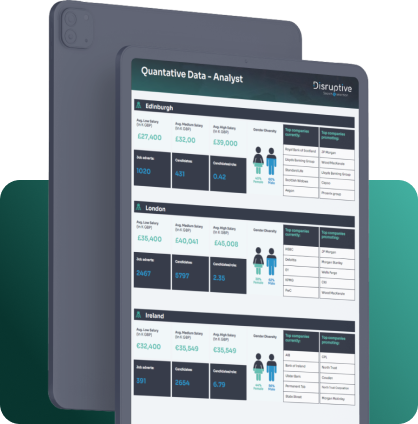TA and HR are both intrinsically people-based roles. On Episode 8 of the Disruptive Mindset Podcast we spoke to Emily Cooper, the HR lead at IDEO, about how we can use positive mindsets to improve our people’s lives and grow companies from the inside.
How are HR and TA roles currently changing?
It’s a big shift that started with personnel departments. There’s been a lot of discussion previously about the HR role becoming that of a strategic business partner, leading the strategy on people and having that tied into the C suite. We are expected to be innovators, to create value internally and externally. That means we have to get things done right. We can’t be solely focused only on strategy, because there are still basic requirements of a people function that we need to meet too. That means being human, taking the time to listen to employees to understand what they’re going through.
There’s a balance between slowing things down and speeding them up. I’m a big fan of automating and digitising where possible, but actually we still need to be humans in our line of work. I work in a human centred design organisation, so we’re thinking about the balance and the friction between people and tech. We are expected to wear so many hats in HR. We’re supposed to be supporting mental health and advocating for employee needs, as well as balancing our business requirements. There are so many shifting priorities that the expectation is massive, and sometimes it can be difficult to meet all of these expectations and manage our time effectively in such a changeable landscape.
How are you driving this strategy and behaviour?
Our work is truly human centred. We’ve worked with incredible clients to build a positive impact in the world, which is amazing. But what we’re not so good at is telling everyone about it, in order to build out our marketing, and let the world know how we can help them. What we’re doing internally is making sure that our voice is heard and enabling everyone to be that change agent, to speak positively out in the world about what we’re doing. What’s changing is the way we’re working, because we need to focus more on our clients and work, and less on internal strategies and initiatives. Because we have so many creative people, often they’re asking, “What can we do to improve our ideas? What can we do to improve ourselves internally?” We’re shifting that mindset to focus more externally on how we can put those efforts towards our clients.
How are principles of quality and excellence shaping your business?
We’re focusing on leadership objectives and internal value. We’re building out clear job descriptions and role expectations for individuals, as well as building manager capability. We want to have great managers who can facilitate the growth and development of our people. That means looking at our internal systems like performance management, and building inclusivity in all of those systems. Our leadership objectives have to include inclusive behaviours, because that diversity of mindsets and opinions is going to be what drives us forwards and creates the best work.
What’s working best for you?
Our ‘magic sauce’ is optimism. When you see someone speaking out in a positive way, or delivering a success story from a client, that’ll boost morale. We do a lot of internal sharing on things that we’re doing well, and things that we’re not doing so well, with confidence and passion. That’s great for the team.
What could you be doing better as a people-focussed professional?
Being honest about the challenges we face is hard, because it is a really difficult role. I’m really passionate about being vulnerable and setting boundaries, because burnout and mental health is real. We’re an always-on culture that has Slacks and emails going on all night because it’s a global business, so it’s hard to switch off. It’s really important for us to model good behaviour around boundary setting. That’s definitely something that I am still learning to do. Something that I think would help is seeing my leaders setting boundaries and managing these challenges publicly too, because it’s always difficult to be the first one to do it.
What does being vulnerable mean to you?
It’s just being honest about how you’re really doing. You never know what someone is going through, and it’s hard when you’re interacting with so many people on a daily basis to have that many meaningful conversations about how they are. Being vulnerable means connecting as humans. It’s definitely a challenge, because it can be a drain. I understand that, and I’m working on it as well, because it can create such a big change in your company culture. Vulnerability is essential for individuals and working relationships because it helps people not to feel so alone.
To find out more about managing through mindsets and leading through vulnerability, tune into The Disruptive Mindset Podcast on Spotify here and Apple Podcast here.


How Disruptive is your Leadership Hiring?
Find out where your management team’s weaknesses are and how you could improve your hiring strategies with this free 5 minute questionnaire.
Contact Us
"*" indicates required fields
